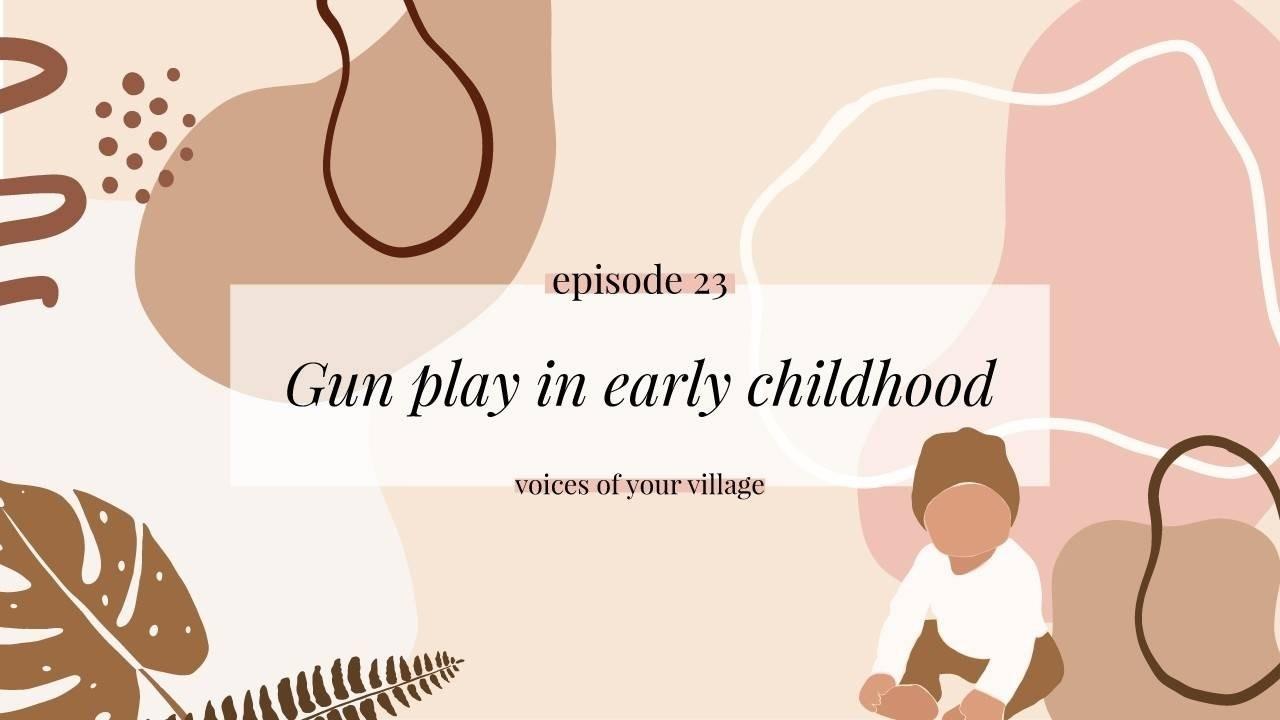Gun play in early childhood, with Angela Garcia

On today’s podcast, I got the chance to talk about a topic that many listeners were interested in learning more about. The topic of gunplay is one the comes with uncertainty as to how caregivers handle this type of play with their kiddos. I had the chance to talk to my friend and former co-worker, Angela Garcia, as we dove into this topic. We have an open discussion about the concerns and uncomfortable feelings that many people have when this type of play takes place. Coming from different views, in regard to this topic, Angela and I get to share our perspectives and thoughts with one another, which leads to an honest and real conversation.
Angela has been a preschool teacher in an early childcare center in Massachusetts for the past two years. Prior to living in Massachusetts, she lived in New Mexico. While growing up, Angela expressed how she was exposed to guns from a young age. With different members of her family owning guns, she was taught at a young age about the dangers of guns. Initially, Angela was opposed to this whole idea, however as she continued to teach, her level of comfort and openness to talk about gunplay and letting it occur within the classroom grew. Within her classroom, Angela allows gunplay to occur as long as it is being played in a consensual manner amongst her students.
As Angela shared, this conversation of gunplay first started because it was a topic that many of her co-teachers were uncomfortable with having, but Angela strongly believed that as a teacher, it was her responsibility to have this conversation and let her students know the dangers that come with gunplay. When given the time to explain and be open about this topic, children are much more capable of understanding what is going on. If children aren’t showing interest in gunplay then waiting to have this conversation with your kiddos is ok. However, when this topic does come into play, being as open and honest as possible is the most important thing a caregiver can do during these conversations.
“Children are capable of understanding very difficult, scary, and uncomfortable things. It’s important that we as the adults are willing to notice and recognize that it is uncomfortable, but still have that conversation.”
Having a strong emotional intelligence is a game-changer when it comes to gunplay because if a child has empathy and social awareness they are able to recognize when the game is no longer is consensual. This not only applies to gunplay but in rough-and-tumble play, the goal is that all children are playing together and are onboard with what is occurring. It requires emotional intelligence for children to recognize that when another child wants to leave the game or doesn’t feel safe then the game must stop. As a teacher, Angela is constantly mindful and is always aware of the interactions that are occurring throughout the play because it gives her the opportunity to scaffold their development of emotional-intelligence. Often times our own biases come into play, which affects the way we handle and deal with these situations. It is important to be mindful of our own biases so when kids are playing we are able to respond from an emotionally intelligent place in order to support their development.
Angela then shared her thoughts on how she would address this topic to students coming from a predominantly African American or Latino community. As Angela expressed, these children know from the beginning the seriousness behind guns and are aware of the effects that guns have. The way that we teach white children versus the way we teach African American children or Latino children is different because whether we want it to be or not, life is different for different races.
“We have to raise them equitably in that manner”
As Angela expressed, from teaching in a predominantly white community, the advantage of being able to have these difficult yet important conversations with her students. As the adult, it is so important to always be aware of what the context is that encompasses their play because it allows the caregivers to see where this play is coming from and allows for teachable moments to occur.
“I also strongly believe that no matter the race you come from or where your background is, children have the right to be in a state of childhood. If we believe that children learn best through play then we have to let them play when it’s a time for play, whether it is uncomfortable for us or not.”
If you wish to connect with Angela you can send her an email.
